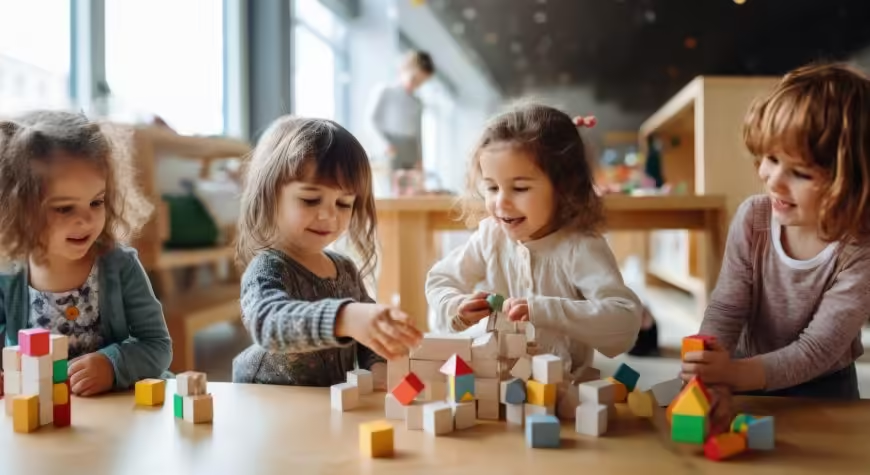Kindy: Let’s Do This! Tips for Parents on how to Prepare for your Child’s Kindergarten Experience

Starting kindy is a big step in the life of a child and for you, as their parent. As the time gets closer and the excitement builds, many parents wonder what they can do to best support and prepare their child for this next step. Here are some practical tips and insights that can help ease the transition for both you and your child. Starting kindy is an exciting milestone, and, hopefully, these strategies help you to feel ready for a successful year ahead.
Establishing routines
Routines are vital for children as they provide a sense of security and predictability. Start establishing a daily routine that mimics what a school day might look like. Incorporate consistent wake-up times, meal times, and even practise transitioning between activities. This will help your child feel more comfortable when they encounter a structured day in kindy.
Fostering independence
As your child prepares for kindy, fostering independence will help them navigate the new environment with confidence. Some of the main skills that may help them include:
- knowing how to pack and unpack their school bags and locate the items they need.
- opening and closing their lunch boxes, including containers or packaging their food comes in (i.e yoghurt pouches, glad wrap on sandwiches and wrappers on muesli bars).
- pulling their pants up and down when using the toilet, washing hands afterwards
- taking their shoes and socks on and off. Given most kindy aged children are not yet able to tie their shoe laces, shoes that slip on/off or have velcro fastenings are often a preferred choice.
Social interactions
Making new friends and interacting with new people is an exciting, but often confusing, part of starting kindy. Listening to others, learning to take turns and share, negotiating and compromising on what to play at lunch time, and various other interactions can bring uncertainty to their day. Arranging play dates with similar aged children and playing games at home that provide the opportunity for turn taking can help them to practise these skills.
Get a lay of the land
While some children may have visited their new school before, particularly if they have older siblings who attend, for others, the school environment is new and unfamiliar territory. Driving past and practising where you will park and walk in, or, if you will be walking or riding to school, familiarising your child with your route and the process of getting to and from school may help them with their initial nerves. Stepping on to school grounds to explore, find their classrooms and play areas will also help to make the environment feel more familiar and less daunting.
Dress the part
Getting used to wearing a uniform may be something new for your child. Practise getting dressed into their uniform, including socks and shoes. This will help them get used to how their uniform feels, build independence and confidence.
Fine and gross motor skills
Kindy kids are often on the go. Supporting them to build confidence in the playground and encouraging them to move their bodies will strengthen their balance and coordination, but will also help them to build the strength and resilience required to complete classroom activities. Climbing, swinging, running and jumping are great ways to encourage physical activity, and obstacle courses will also give them the opportunity to try different movements as well as plan and problem solve. Movement is also a wonderful tool for emotional regulation.
Fine motor skills, such as those used for writing, using scissors and tying shoe laces will be practised at kindy. Being able to write their name is not something that we would expect of a child prior to starting kindy. The best way to practise and strengthen those hands and fingers is to make it fun! Building with blocks and Lego, digging at the beach or in the garden, using play doh or rolling, squeezing and pushing when baking cookies, are some fun and simple ways to gets their hands working.
Talk it out
Keep the lines of communication open with your child. Talk about what they can expect on their first day, including new friends, exciting activities, and even potential challenges. Encourage them to express any worries or excitement they might have. As a parent, your support is crucial during this transition. Share your own stories about starting school and the adventures that await. Stay positive and reassuring; your attitude can significantly influence how your child feels about this new chapter. Reading story books together about starting school can help start conversations and ease some of the pressure.
Preparing for kindergarten is not just about academics; it’s a holistic process that encompasses emotional, social, and physical development. By focusing on these key areas and fostering a nurturing environment, you’ll help your child feel equipped and excited for the journey ahead. Remember, every child is unique, and progress will vary. Celebrate their achievements, no matter how small, and enjoy this special time in their life. If you would like additional support for your child to assist them to transition and develop these skills, please get in touch on 6381 0071 to book an appointment – we would love to meet you!